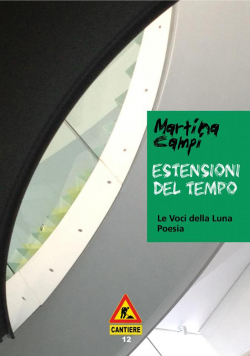Editorial
by Francesca Del Moro
“In the forest lives a monster
and he looks so very much like me”.
PJ Harvey
In its negative meaning, the word “monster” refers to a real or fictitious being that is physically deformed or whose behaviour is extremely amoral. In the latter sense, a monster is often regarded as the embodiment of human wickedness in general or as the part of ourselves that we find it difficult to come to terms with, because it is either obscure and dangerous or disastrous and disgusting. But a monster can also be the target chosen by a society that needs to unite against an enemy that can fulfil people’s morbid curiosity, satisfy their desire of feeling better people, offer a way out to their frustration. Silvio Perfetti’s rhyme leads us into the mind of a murderer and brings to light a very human conflict that is easy to empathize with. In Vera D’Atri’s poem, the woman overwhelmed and disfigured by her many tasks becomes a grotesque goddess. The monster that Ugo Rapezzi paints with quick strokes is visually effective too: the new man perpetually connected to a machine that soaks up the least shade of thought from him. And the monster in which Valentina Gaglione sees her reflection is a fragile individual living on the fringes of a society that makes him/her angry and holds him/her up as an enemy.
The monster is the opposite
by Valentina Gaglione
The fear of living
is a tired monster
every centimetre of abstraction
is a slice of indescribable loneliness.
Time
that slips away
without leaving any beat.
A melancholic monster,
enrolled by the cleaning police
in the role of the bad
that changes his age and story
but if I speak to him
I discover that even now
he is still a part of me.
The sharp teeth he’s grinding today
were white angel wings yesterday.
Dixanite
by Vera D’Atri
Goddess Kali hanging in the wardrobe,
I am nothing,
I’ve got ten hands, and I am nothing.
I am here with the washing powder on fire,
bleached by the labours of my days,
as lazy as the bed’s brass,
full of cigarette stubs, sharp.
I am here for a lot of things,
some of them explode sometimes;
I just can’t take them and I’ve got ten hands.
Homo Novus
by Ugo Rapezzi
His radar-glances
are cardioabsent
computer beams.
A talking hole
in his face bursts
with stammering bits.
The encephalonothing
is switched on
by the videocontrols.
With ungulate
and lazy limbs
he artlessly type,
and, connected with
the social network,
he seems to smile.
Coach 17
by Silvio Perfetti
Forgetful and confused
I wander in the wood
Panting as I smell
The beech and the moss
But I can’t stay here
To watch with my own eyes
The one I had to drown
With my hands die.
I am running off, I know
Into the hands of fate
I am running off, I know
With a bitter taste in my mouth.
Forgetful and confused
Waving words
Useless to my mind
They don’t hit my heart
But I can’t stay here
And watch with my own eyes
The one I had to drown
With my hands die.
Estensioni del Tempo
by Martina Campi
When we are
in front of each other
you hold my heart
in your hands after
you gave it back its beat
and now you say
you want to know me.
Sono come sassi che cadono in uno specchio d’acqua le parole che Martina Campi ti depone addosso con leggerezza, con la delicatezza e l’impalpabile armonia che la contraddistinguono come scrittrice e come interprete della sua poesia accompagnata dalla musica del compositore e polistrumentista Mario Sboarina. E dalla ferita dell’acqua che subito si rimargina inevitabilmente si propagano cerchi infiniti. Sono le associazioni mentali, visive, musicali innescate da queste brevi liriche. A un primo impatto questi versi ti lasciano un po’ incerto sul loro significato e le loro intenzioni ma poi ti accorgi che le immagini che evocano ti rimangono attaccate agli occhi, i pensieri che distillano ti perseguitano e si sviluppano per proprio conto, come “estensioni” non solo del tempo, ma dello spazio, della mente. Con una videocamera appesa al polso Martina si muove attraverso paesaggi familiari offrendo angolazioni sempre nuove: inquadra dall’alto “traiettorie d’angoli e strade e capelli”, scende in picchiata attraverso il “colletto, l’occhio che cade, il mondo per le scale”, esegue un montaggio di dettagli a costruire un ritratto giustapponendo “i piedi nel via vai, le mani al telefono, le bocche briose”. L’obiettivo di Martina è in grado di cogliere e restituirci con parole rivelatrici le percezioni e gli stati d’animo che non sapremmo descrivere, che sgorgano in un attimo, che si trascinano dietro pezzi della nostra vita (lo zucchero mentre fuoriesce / dai barattoli / del mattino, lucidi / perché le mani / ti ricordano / quando hai nuotato / al largo, la prima volta / e poi lo raccontavi) e a volte si dota di un filtro che produce visioni surreali di impressionante potenza (sono tutti questi occhi / come uova appese / assodate, come esche / come ami allacciati / alle ginocchia). Una scrittura densissima, immaginifica e originale che, malgrado la sua ricercatezza e complessità, non suona mai affettata, arrogante o vuotamente virtuosistica. La poesia di Martina è assolutamente sincera, rispecchia la sua acuta e particolare sensibilità, gli occhi che ci presta per riscoprire la realtà, ammantandola di significato, di bellezza, di musica.
Estensioni del Tempo
Martina Campi
Le Voci della Luna, 2012

